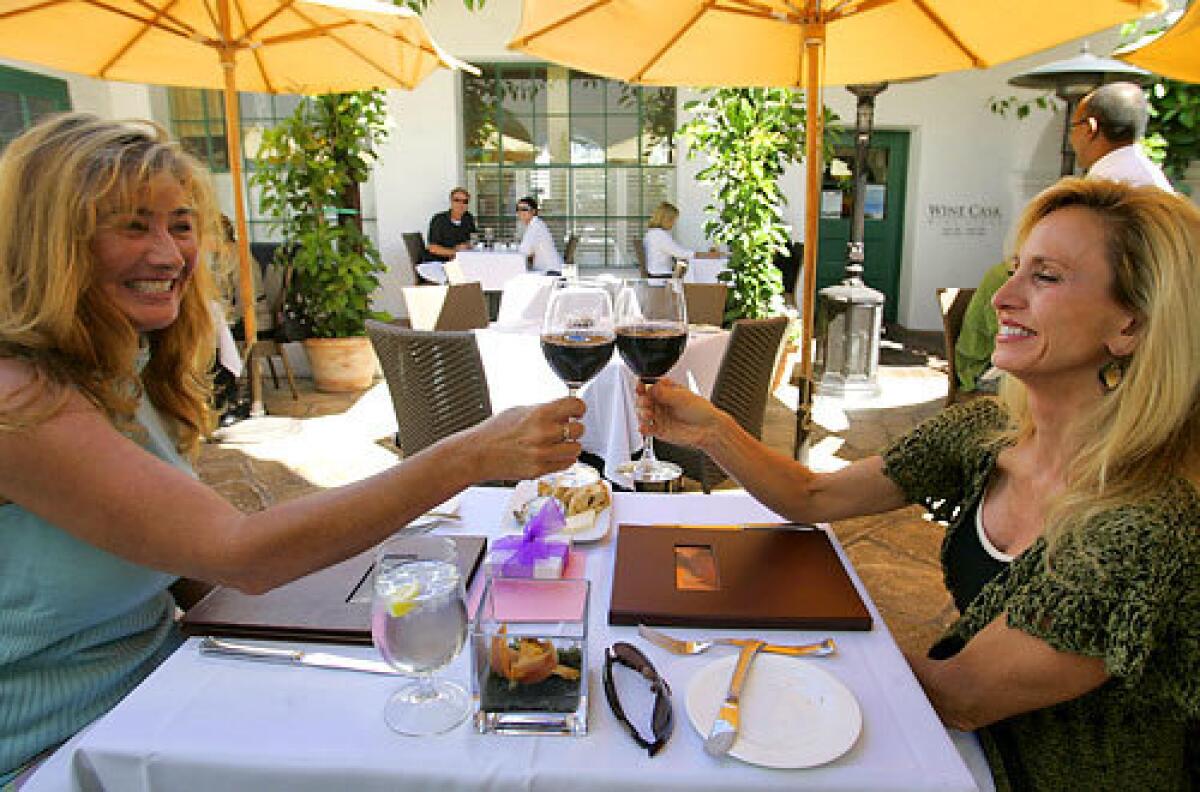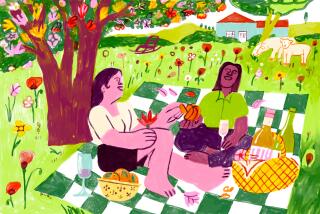Restaurant review: the Wine Cask in Santa Barbara

- Share via
For more than 25 years, Wine Cask has been a fixture on the Santa Barbara -- and Central Coast -- wine scene. Founded in 1981 by Doug Margerum and family, the restaurant and a wine shop in recent years has been more notable for its fat, comprehensive wine list than its food. Chefs came and went, but whoever was at the stoves, the menu rolled on, seemingly oblivious to any change: old-style California cuisine with fancy flourishes and the occasional Latin touch.
Last year, Margerum, who now makes wine under his own label, put Wine Cask up for sale. The buyer? Bernard Rosenson, who also owns the Sky Room in Long Beach. (Wine Cask in Los Olivos was not part of the deal. That property reverted back to Fess Parker Wine Country Inn, which renamed it Restaurant Marcella.)
FOR THE RECORD:
Wine Cask chef: Last week’s review of the Wine Cask restaurant in Santa Barbara misspelled the chef’s name as John Pettit. The correct name is John Pettitt. —
Shortly after his purchase, Rosenson cut down the shaggy eucalyptus tree that had anchored the Wine Cask’s courtyard patio for decades -- a move that hasn’t endeared him to locals. For the new owner, the tree had a certain nuisance factor, shedding leaves and droppings on the patio, so off it went to that log pile in the sky.
After sprucing up the place a bit, which included replanting the courtyard to more closely resemble what it looked like in a 1920s photo, Rosenson hired a new chef. He’s John Pettit, former chef de cuisine at Mélisse, and before that chef of Michael’s, both in Santa Monica.
Pettit’s new menu reflects what’s going on now in Southern California cuisine and introduces cutting-edge techniques and influences to the long-running wine country restaurant -- with mixed results.
The new plantings have yet to grow in, so the patio seems stark. Even so, it’s still incredibly pleasant dining outside on a summer evening, sheltered by the whitewashed wall. Inside the rather grand dining room, at a table beneath the high, wood-beamed ceiling painted in a Spanish motif, the effect is wine country elegant.
Service is some of the best in Santa Barbara, considerate and friendly. Servers are quite familiar with the menu, and when it comes to wine service, they know how to pour a glass and decant a bottle. Sommelier-wine director Thomas Keim is a relaxed presence, talking about wine without a hint of pomposity, a trick that’s not all that easy.
The wine list offers a heady lineup from the Central Coast, including sought-after cult labels, newcomers and well-regarded pioneers of winemaking in the area. But if you want to taste a Santa Rita Pinot against a Burgundy or a Pinot from Napa Valley, you can do that too. There’s also a fine wine-by-the-glass program.
Under chef Pettit, the food is more ambitious than that of previous chefs. The menu seems somewhat smaller too, which is a good thing. On the left is the daily tasting menu; on the right, a la carte choices. You can also order any of the dishes from the tasting menu on their own.
For starters
THE CHEF usually starts things off with a sophisticated amuse, maybe a scallop flan in a tiny glass. Flavored with black truffles and dill, it’s a takeoff on chawan mushi, the Japanese savory custard. Rich and silky, it’s studded with bites of scallop and garnished with a dusting of crunchy tobiko (fish roe). Black truffles and dill may sound counterintuitive, but the dill is understated, its grassy note a complement to the truffle’s earthiness.
A roasted eggplant soup swirled with yogurt and topped with a splash of basil emulsion achieves a fine balance of flavors. And fat freshwater shrimp nestled in a warm potato and leek salad wins over everyone at the table with its bright, clean flavors. A duo of seared and raw kampachi is confused -- too many elements on the plate -- though I did like the cool crystals of black radish shiso granite with the sashimi.
The idea of stuffing ravioli with duck rillettes is an intriguing one. Pettit presents a single ravioli, plump as a pincushion, sitting on a bed of delicious, bright green creamed spinach scattered with shimeji mushrooms. So far, so good, except that the rillettes, duck meat slowly cooked off in the fat of the bird, are intensely salty. Normally, you’d eat rillettes on a slab of bread to cut the salt. A small dab of the duck distributed over many ravioli might work better.
The patio, empty when we arrive for an early dinner, gradually fills with a mix of locals and tourists who consider Wine Cask a destination restaurant. And waiters are kept busy opening bottle after bottle of wine.
The tasting menu includes local abalone, so I order that dish a la carte. The concept is terrific -- abalone sauteed in yuzu brown butter and served with a white corn gelée and fresh soybean, but it falls down some in the execution, overcooked and drowning in butter. Wide, hand-cut pappardelle make a very light main course tossed in Parmesan and sweet corn jus. The English peas are starchy, though, and the shaved summer truffles are more crumbs than actual slices.
Spare the reduction
LAMB comes three ways or four ways, depending on the night -- a nice medley of cuts such as a braised shank, a tiny chop or the loin. They’re dainty little bites, nice enough served with ricotta gnocchi the shape of quenelles. It’s an excellent dish for one of those Santa Rita Pinots.
So, in theory, are the Kurobuta pork cheeks. The heritage pork is tender and unctuous, but it’s done in by a dark, almost black reduction poured over the cheeks like chocolate sauce.
It’s time that chefs trained in California-French cuisine gave up these dated, over-reduced sauces that obliterate the other ingredients, not to mention the accompanying wines. It’s the equivalent of winemakers producing over-extracted, high-alcohol wines -- intensity for intensity’s sake.
Short ribs get a similar sauce and suffer from the same salty exuberance. While the texture of the slow-cooked ribs is perfect, it’s hard to fully appreciate them until you get to the center of the cut, where salt hasn’t penetrated. Duck breast is a good red wine dish, though, presented with a citrusy Meyer lemon duck jus and a pinched line of black rice and a few baby beets.
Come dessert, there’s an enjoyable coffee pot de crème served in a cup, with whipped cream and vanilla bean shortbread cookies. A mixed berry shortcake needed more strawberry coulis to juice up the berries. Slushy root beer granita ladled over vanilla bean ice cream is sheer heaven for a friend who spent summers as a teen working at a root beer stand. For me, it’s too sweet.
All in all, dinner at Wine Cask is a pleasant diversion when you’re looking for a wine-friendly experience in Santa Barbara. The wine list is still strong. The kitchen under Pettit is moving in a more ambitious direction. All it needs is focus, a tighter lid on the salt shaker, and some tweaking.
Wine Cask Rating: * 1/2Location: 813 Anacapa St., Santa Barbara, (805) 966-9463 or (800) 436-9463; www.winecask.com.Ambience: Handsome, wine-focused restaurant in Santa Barbara’s El Paseo with a Spanish revival dining room and a spacious outdoor courtyard framed by the restaurant and wine shop. The new chef is John Pettit, former chef de cuisine of Mélisse in Santa Monica.Service: Informed and intelligent. Wine-friendly.Price: Dinner appetizers, $12 to $22; main courses, $34 to $52; dessert, $7 to $12. Daily tasting menu, $90 per person ($125 with wine pairings); vegetarian tasting menu, $70 per person ($105 with wines); chef’s eight-course tasting menu, $115 per person ($175 with wines).Best dishes: Eggplant soup, duck rillettes ravioli, freshwater shrimp with warm potato and leek salad, local abalone, duck breast, lamb trio or quartet, coffee pot de crème, mixed berry shortcake.Wine list: Comprehensive Central Coast selection, along with good choices from other regions, including Europe. Corkage fee, $25.Best table: One at the edge of the outdoor courtyard.Special features: Wine shop across the courtyard.Details: Open for lunch 11:30 a.m. to 2:30 p.m. Monday through Friday; for dinner, 5:30 to 9 p.m. Monday through Thursday, until 10 p.m. Friday and Saturday. Full bar. Valet parking in adjacent lot.To see a photo gallery, go to latimes.com/food.Rating is based on food, service and ambience, with price taken into account in relation to quality. ****: Outstanding on every level. ***: Excellent. **: Very good. *: Good. No star: Poor to satisfactory.
More to Read
Sign up for The Wild
We’ll help you find the best places to hike, bike and run, as well as the perfect silent spots for meditation and yoga.
You may occasionally receive promotional content from the Los Angeles Times.










